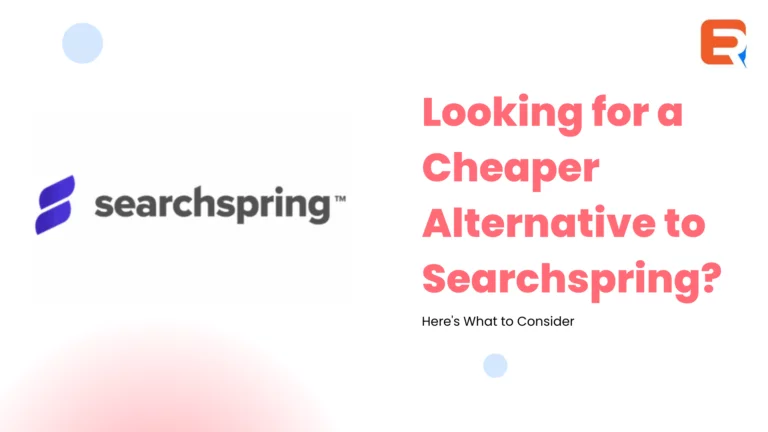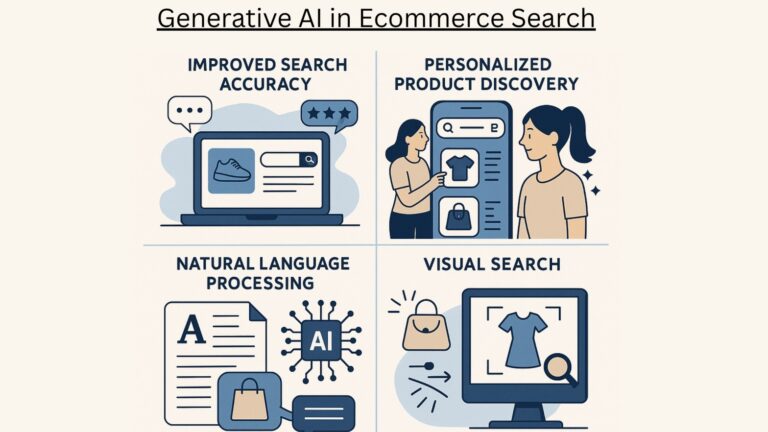In the world of eCommerce, the way customers search, filter, and discover products can directly influence your revenue. That’s why many online businesses turn to specialized site search and merchandising platforms like Searchspring to elevate their customer experience.
However, as priorities evolve and budgets shift, a growing number of retailers are beginning to explore more cost-effective options. If you’ve recently searched for a cheaper alternative to Searchspring, you’re likely among the many store owners trying to strike the right balance between capability and cost.
In this article, we’ll explore the main reasons businesses are considering alternatives to Searchspring in 2025 and what factors to evaluate when making a change.
Why Businesses Choose Searchspring
Searchspring is known for its feature-rich toolkit, the platform provides capabilities like:
-
AI-powered search
-
Faceted navigation
-
Visual merchandising controls
-
Personalized product recommendations
-
Reporting and analytics
These features are especially attractive to larger eCommerce operations looking for deep customization and merchandising power.
But Why Are Businesses Looking for Alternatives?
Despite its robust functionality, Searchspring isn’t the perfect fit for everyone — especially in 2025. Below are the key reasons many store owners and decision-makers are actively seeking more affordable alternatives.
1. Rising Pricing Concerns
One of the most cited reasons for switching away from Searchspring is the overall cost of the platform. While pricing is not publicly listed on their website, many users have noted that the custom-quote model can become expensive — especially as store traffic or catalog size increases.
For smaller stores or growing businesses with limited budgets, these price points can create pressure to justify the ROI. Even for mid-sized merchants, the monthly cost may outweigh the perceived value, particularly if only a subset of features is being used.
2. Lack of Pricing Transparency
Another pain point that pushes users to explore other options is unclear pricing. With Searchspring, most businesses must engage in sales calls to receive a quote, which can vary based on several factors such as:
-
Monthly traffic volume
-
Number of SKUs
-
Desired features (search, merchandising, recommendations, etc.)
-
Platform integrations
For businesses trying to evaluate solutions quickly or forecast long-term costs, the lack of upfront pricing can create friction and delays in decision-making.
3. Post-Acquisition Shifts in Strategy
Searchspring was acquired by private equity firm Scaleworks, and like with many acquisitions, such changes can impact everything from pricing structure to feature prioritization and customer support.
While the product has continued to evolve, some customers have expressed concerns that post-acquisition changes may not align with their expectations or long-term goals. In some cases, users have noticed shifts in service levels or changes in how features are packaged, which could lead to increased costs or operational adjustments.
4. Complexity and Feature Overload
Searchspring offers a wide array of advanced features, particularly in the merchandising and rule-based customization space. While this is beneficial for large teams and enterprise operations, it can feel overwhelming for smaller businesses or teams without dedicated technical or merchandising resources.
Some merchants report using only a small percentage of the available tools, which makes them question whether they’re getting full value for their investment. The steep learning curve and ongoing management needs can make the platform feel more like a long-term project than a plug-and-play solution.
5. The Need for Faster Setup and Simpler Maintenance
For many eCommerce teams, speed of implementation is key. Searchspring’s custom integrations and setup process can take time, and merchants looking to move quickly may prefer platforms that can be deployed in hours, not weeks.
Ongoing maintenance and optimization also require a certain level of platform knowledge, which can be difficult to manage in fast-paced retail environments with limited internal bandwidth.
What to Look for in a Cheaper Alternative
If you’re exploring options beyond Searchspring, here are some important criteria to consider:
-
Transparent Pricing: Look for a provider that clearly outlines pricing tiers and features upfront, allowing you to budget with confidence.
-
Ease of Implementation: A solution that integrates quickly with your platform (like Shopify, WooCommerce, or Magento) will save time and reduce go-live friction.
-
Core Feature Focus: Identify the specific search and merchandising features your business actually needs. A simpler platform with focused capabilities may serve you better.
-
Mobile Optimization: Ensure the solution works seamlessly across devices to maintain a consistent customer experience.
-
Support and Flexibility: Choose a vendor that offers responsive support and flexibility for customization without unnecessary complexity.
Final Thoughts
There’s no doubt that Searchspring has set a high bar in the eCommerce search space. But as business goals, budgets, and operational realities evolve, it’s natural for teams to reassess whether the tools they’ve invested in still deliver the value they expect.
If you’re looking for a solution that’s more cost-effective, easier to manage, and quicker to deploy, the market in 2025 offers several viable paths forward — many of which are designed with simplicity, flexibility, and affordability in mind.
ExpertRec is one such solution that caters to this growing demand — offering a user-friendly, AI-powered search engine at a more accessible price point for businesses of all sizes.
Frequently Asked Questions about Cheaper Alternatives to Searchspring
Why are businesses looking for a cheaper alternative to Searchspring?
Many businesses are seeking lower-cost solutions due to Searchspring’s high pricing, lack of transparent plans, and complexity for smaller teams.
Is Searchspring too expensive for small businesses?
Searchspring’s custom quote pricing model can become costly, especially for small to mid-sized businesses with tighter budgets.
Does Searchspring have public pricing?
No, Searchspring does not display pricing publicly. Businesses must request a quote based on factors like traffic, SKUs, and features.
Are there simpler options than Searchspring?
Yes, some businesses look for platforms with faster setup, easier maintenance, and only the features they need without added complexity.
What should I look for in a Searchspring alternative?
Key things to consider include transparent pricing, quick implementation, essential feature coverage, and strong support.




